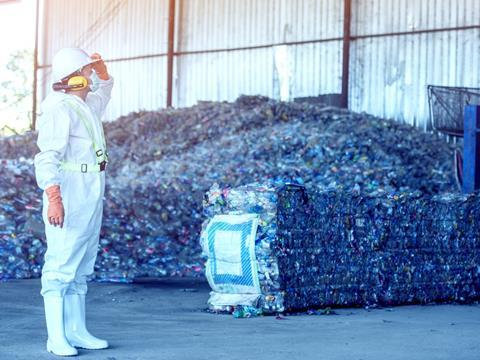
Amazon is working with the US Department of Energy’s BOTTLE Consortium in an effort to develop a new recovery and recycling process for mixed plastic waste streams while designing wayward materials to biodegrade in the environment.
Amazon refers to a model proposed in a Science article regarding the feasibility of achieving net-zero or net-negative carbon emissions in the life cycle of various plastics – utilising both mechanical and chemical recycling in conjunction with carbon capture, as well as feedstock derived from captured carbon and/or biomass. This would, in theory, make use of excessive carbon dioxide in the atmosphere, and the model recommends that current recycling technologies should expand to keep as much carbon in the loop as possible, with a Nature Geoscience article suggesting that 20% of all greenhouse gas emissions can be attributed to the production of materials.
On the other hand, Amazon notes that breaking down the strong carbon-carbon bonds in conventional polyolefins is a costly and, where contamination is involved, impossible process that requires energy-intensive chemical recycling procedures to recover and use the molecules. These materials are also not thought to biodegrade easily and, when they end up outside the recycling stream, can contribute to plastic pollution.
As such, its collaboration with the BOTTLE (or Bio-Optimized Technologies to keep Thermoplastics out of Landfills and the Environment) Consortium intends to develop a recovery and recycling process for such materials that is both technically and economically viable for industry players. It is anticipated to result in an energy-efficient chemical processing technology that can break the labile bonds in a mixed-plastic waste stream and produce feedstock for a closed-loop recycling system, with the molecular structure of any materials that escape the stream designed to biodegrade in a natural environment.
This new deconstruction technology is expected to negate the need to sort plastics prior to the recycling process and remain independent of the commercial success of a single type of material, as well as enabling the faster scaling of technology due to the greater availability of material volumes. Incentivising the use of plastics that are both biodegradable and valuable as sources of feedstock is expected to lessen pollution while reducing additional feedstock production and, in turn, carbon emissions.
Another intended outcome of the collaboration is to develop new polymers from the deconstructed materials, where appropriate, although Amazon also underlines the value of closed-loop recycling in certain applications. The company plans to process the materials into films to examine the relationship between their structure and properties, test their industrial and natural compostability, and work towards their applications in designed-for-recycling packaging.
Plastics that are biodegradable in any capacity are easier to cut down into intermediate chemicals than their non-biodegradable counterparts, Amazon claims. As such, mechanical recycling and chemical processes such as pyrolysis are said to respectively allow the infinite recycling of their carbon molecules without degrading their properties and a low-energy deconstruction of their carbon-carbon bonds.
Additionally, the process is expected to result in lower-cost feedstock for the production of new materials, which will in turn cost less and become more desirable over traditional plastics.
A current collaboration between Borealis and Ecopost aims to scale up the collection and recycling of Kenyan plastic waste – formalising collecting processes, training and recruiting collectors, and expanding its recycling capability.
LyondellBasell and KIRKBI A/S have also signed an agreement to invest in APK’s Newcycling, a solvent-based recycling technology for LDPE.
If you liked this article, you might also enjoy:
McKinsey on whether or not on-pack sustainability claims affect consumer spending
A deep dive into the most important packaging sustainability trends and solutions














No comments yet